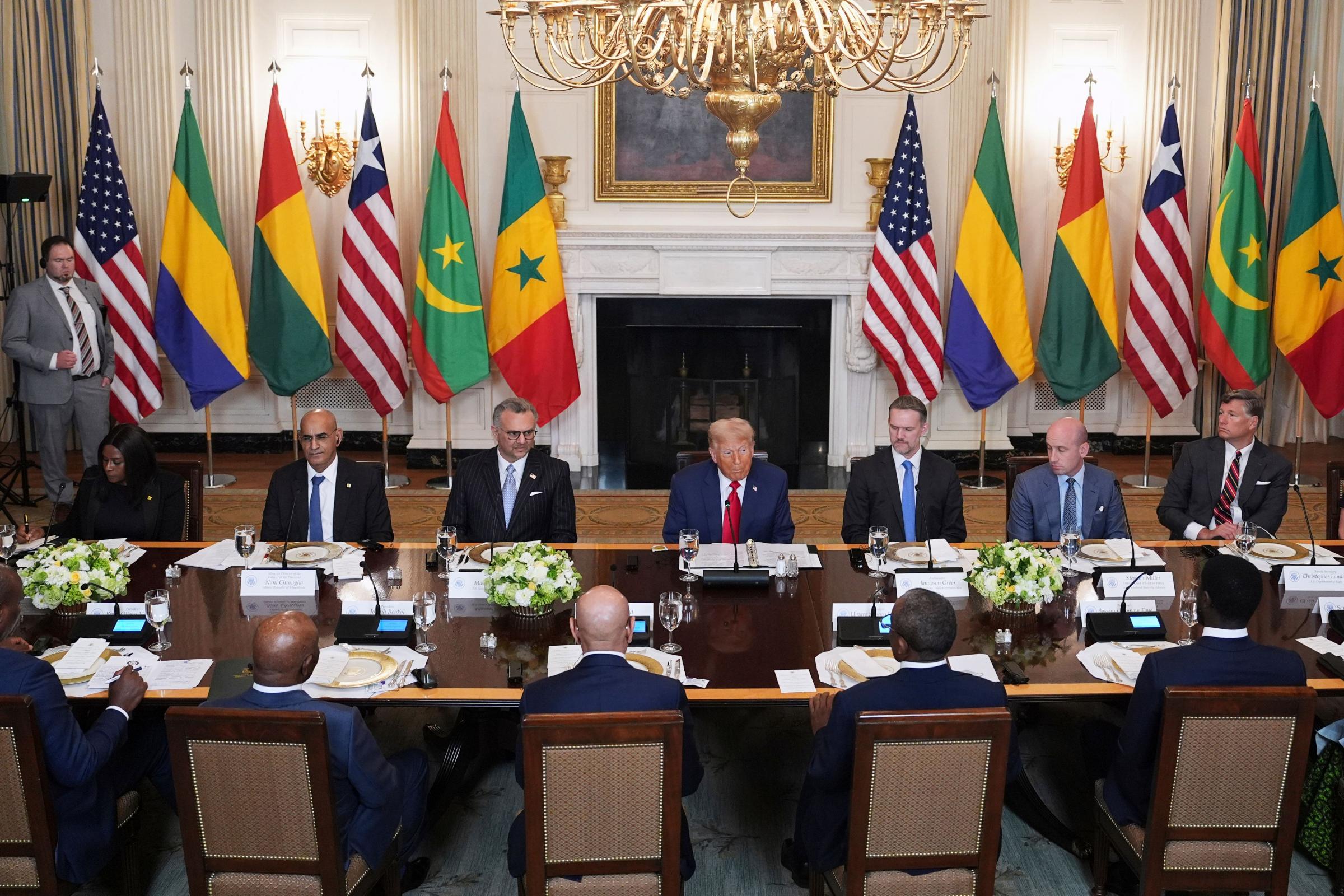Invitaciones selectivas reflejan un cambio en las relaciones entre EE. UU. y África
The United States recently hosted a high-level meeting with leaders from five African countries in a move designed to highlight economic partnerships—but the selective guest list has sparked debate over Washington’s motives and long-term strategy.
At a working lunch held at the White House, President Donald Trump welcomed the presidents of Mauritania, Guinea-Bissau, Liberia, Senegal, and Gabon. According to U.S. officials, the goal was to identify new commercial opportunities that could benefit both American interests and African partners. However, the absence of the continent’s major economic players—such as Nigeria, South Africa, Egypt, and Ethiopia—raised questions about the broader intent of the summit.
La exclusión de potencias regionales genera críticas
Los países omitidos del evento son miembros o socios cercanos del bloque BRICS, que incluye a Rusia y China —naciones que la administración Trump considera rivales geopolíticos. Al excluir a estas economías clave, los críticos argumentan que la cumbre sirvió como herramienta para aislar a los países alineados con BRICS y promover lazos bilaterales con socios más “complacientes”.
Professor Christopher Afoke Isike, a specialist in African international relations, described the invited nations as “low-hanging fruit”—states rich in natural resources but lacking the geopolitical clout to resist U.S. terms.
“Most African regional powers are already aligning themselves with BRICS or seeking membership,” Isike noted. “These five invited countries are outside that strategic alignment, making them more accessible for direct U.S. influence.”
El enfoque comercial eclipsa la diplomacia tradicional
During the summit, African leaders praised President Trump and advocated for investment in their nations’ rich reserves of minerals and raw materials. President Brice Oligui Nguema of Gabon emphasized that their countries are not poor, but underdeveloped due to a lack of infrastructure and investment.
“Necesitamos socios para alianzas de beneficio mutuo, no caridad”, dijo Nguema. También animó a EE. UU. a comerciar directamente con los gobiernos, evitando intermediarios, y destacó el potencial mineral de África como punto de entrada clave.
La conversación también abordó temas como la piratería en el Golfo de Guinea y las tendencias migratorias desde África Occidental. Estos países, situados en la costa atlántica, se están convirtiendo en focos de atención tanto en los diálogos de seguridad como de migración con Washington.
Cambio de política estadounidense hacia un enfoque transaccional
La cumbre marca una continuación del alejamiento de la política tradicional de EE. UU. bajo administraciones anteriores, que priorizaban la cooperación multilateral y la asistencia humanitaria. Los programas de USAID han sido drásticamente reducidos bajo Trump, reemplazados por un modelo que prioriza el comercio recíproco y la inversión estratégica.
Trump has also floated new tariffs targeting nations he deems “anti-American,” and his administration has imposed travel restrictions affecting many African and Middle Eastern countries. Despite these moves, the president argues that his strategy will foster self-reliance among African states and reduce dependency on U.S. aid.
“We’re not here to give handouts,” a senior White House official stated. “We’re here to build lasting partnerships based on mutual benefit.”
China sigue siendo un competidor omnipresente
La sombra de China se hizo sentir durante toda la cumbre. Como el mayor socio comercial bilateral de África, Pekín ha consolidado su influencia a través de proyectos de infraestructura e intercambios educativos. En contraste, el enfoque actual de EE. UU. se centra en el acceso a minerales críticos y la cooperación en seguridad.
Chinese leaders have recently expanded zero-tariff treatment for most African nations, further challenging U.S. efforts to regain influence. Countries like Guinea-Bissau and Senegal have publicly praised China’s support and ongoing engagement.
Una apuesta arriesgada por la influencia
Los analistas creen que el enfoque selectivo de Trump podría redefinir las relaciones entre EE. UU. y África durante los próximos años. Aunque las cinco naciones elegidas podrían beneficiarse de un aumento en la inversión y la cooperación en seguridad, las consecuencias diplomáticas de excluir a las principales economías africanas siguen siendo inciertas.
A more comprehensive African leaders’ summit is reportedly in the works for later this year. Until then, Washington’s strategy signals a decisive shift—from humanitarian support to commercial transactions—in its quest to counter China and reshape the balance of power on the continent.
Si esta reconfiguración resultará sostenible o simplemente simbólica está por verse, pero algo es claro: África se ha convertido en un escenario central de la competencia de poder entre Washington y Pekín.



